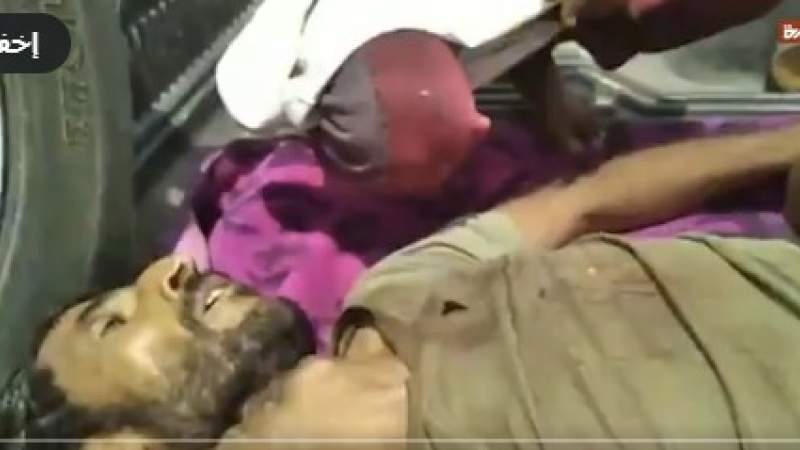Saudi Arabia's Bermuda: Yemeni Man Burned Alive Seeking Work

Yemen: In a harrowing scene that encapsulates the tragedy of a nation crushed by the ongoing Saudi-American-Israeli aggression and blockade, young Yemeni Abdullah Ali Qassem Al-Shamri took his final breath—charred and tortured—at the hands of Saudi border guards. His only crime: leaving his impoverished village in Sa'adah’s Haydan district in search of work to feed his family, worn down by hunger and siege.
With his two companions, Adel Salem and Salah Al-Jarfi, Abdullah left the remote village of Dhuwaib on a perilous journey—not to smuggle, nor to violate border laws, but simply to escape the slow death imposed by war and economic strangulation. Years of infrastructure bombardment and a complete closure of borders and crossings had left Yemenis with no options.
Before the journey could end, Saudi army patrols intercepted the trio, taking them to a secret detention site. There, began the chapters of horror—blood and flames. For Yemenis seeking a livelihood, the Saudi border has become a new "Bermuda Triangle"—a place from which many never return. Those who do are often broken, burned, or traumatized.
“They burned us with fire... seared us with red-hot iron.”
Survivor Salah Al-Jarfi, bearing the burn scars across his body, recounts: “They tortured us with fire, heated iron until it glowed red, and pressed it onto our flesh. They made us walk on burning coals. They tortured Abdullah before our eyes until he was martyred. They showed no humanity, no mercy—even though we carried no weapons, posed no threat. We only sought work.”
Adel Salem, also a survivor, says through choked tears:
“We asked only for a living—but were met with fire and beatings. Abdullah died in front of us, and we couldn’t save him. We returned burned and starving. His screams still haunt us.”
The two survivors came home with third-degree burns, while Abdullah's body was left behind in a valley deep within Saudi territory—burned and tortured to death.
This was not an isolated crime. It is one of a growing list of systematic atrocities by the Saudi military against Yemenis on the border—people driven by desperation and starvation into the line of fire.
Victims are often from poor border regions, risking everything for a bite of bread, only to find themselves in hidden prisons of fire and silence.
These are not mere violations—they are acts of economic warfare, part of a broader Saudi strategy. A war that doesn't just bomb and starve—but humiliates and tortures civilians, as if it were a deliberate policy of slow extermination.
Abdullah was not a "smuggler," as the Saudis may claim. He was a victim of a hunger war, a casualty of policies aimed at destroying civilian life in Yemen.
His death was not fate—it was a deliberate result of hostile policies that have turned Saudi border zones into open graves, from which few return whole.
While Yemenis burn inside Saudi borders, no cases are recorded of Saudis killed on the Yemeni side—a stark reminder that this is a one-sided war, in which the Saudi regime wields fire, steel, and blockade as weapons to kill dignity before bodies.
What happened to Abdullah is a documented war crime, a blatant violation of international law that demands investigation and accountability—not the suspicious silence of the global community.
To be killed by fire, without trial, without charge, only because you're poor and seeking life, is a stain on humanity—and on every human rights organization that claims to defend the voiceless.
In an era of brutal aggression by the US-Saudi-Israeli-UAE alliance, a Yemeni may die by missile, airstrike, or shell—but Abdullah was killed slowly, in silent prisons of pain and fire, without justice, without voice, for daring to want a life.
Today, Yemenis face a suffocating economic war, waged by Saudi Arabia, that touches every aspect of survival—food, medicine, jobs, currency, and even the right to breathe beyond war. Migration for survival has become a gamble of death.
Saudi Arabia’s border has become a descent into hell—where dreams of the poor vanish, and their bodies burn. This is not a rare crime, but a repeated pattern in countless untold stories of Yemenis who embarked on journeys of no return.
Whoever enters the Saudi border "Bermuda" may never come back. And those who do return, carry wounds—and the echo of their fallen companions’ screams.
This is not just the story of Abdullah—it is the story of a people, whose dignity is stripped, and humanity torched, at borders turned into mass graves for the weak: pilgrims, travelers, and expatriates.
Let us not forget the massacre of the Tanuma pilgrims—it is never far away.
#Yemen #Saudi Arabia about week-
12:20
Abu Sharif to Al-Masirah: If the nation had stood seriously behind the resistance fronts, the situation would have been different
12:19
Abu Sharif to Al-Masirah: After Yemen closed the port of Umm Al-Rashrash, Arab regimes, unfortunately, established a land bridge and received ships to transport supplies to the enemy
12:19
Abu Sharif to Al-Masirah: The “Al-Aqsa Flood” operation was not a reaction to a specific crime committed by Israel, but rather to decades of extermination and displacement
12:11
Gaza Government Media Office: The occupation disregards all international calls for a ceasefire and insists on continuing the systematic killing of civilians
12:11
Gaza Government Media Office: 106 martyrs have been reported in Gaza since the calls for a ceasefire 72 hours ago





